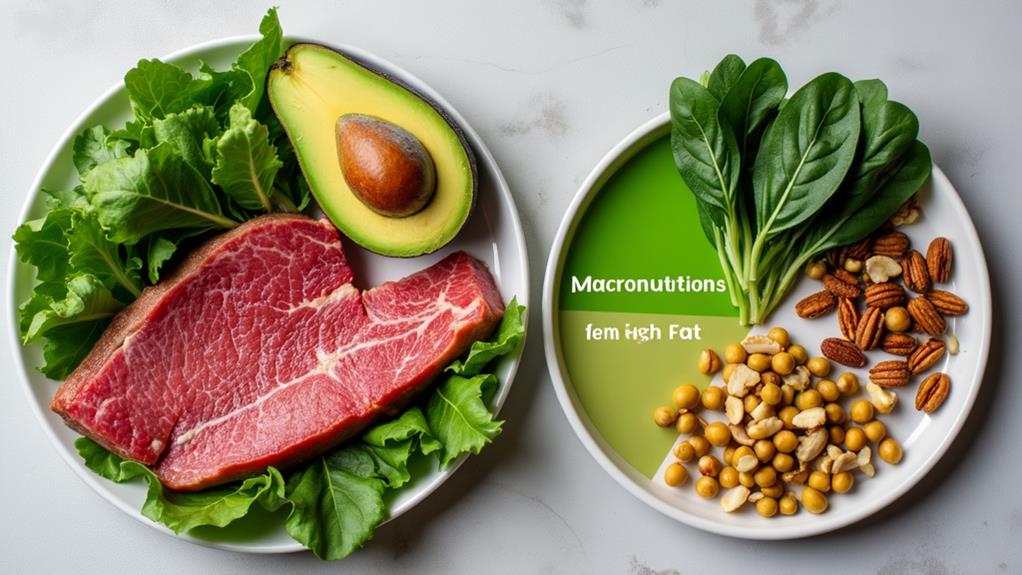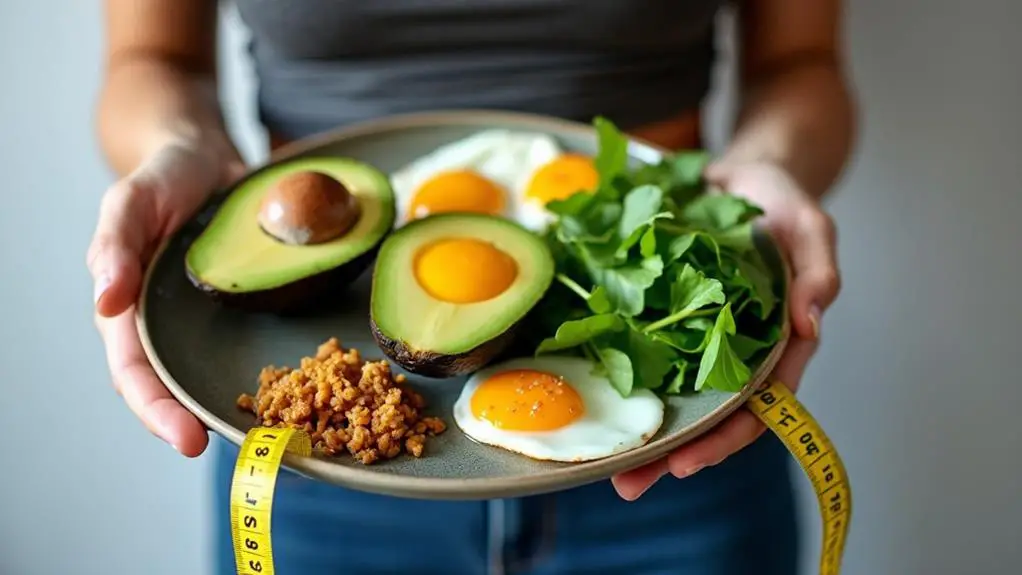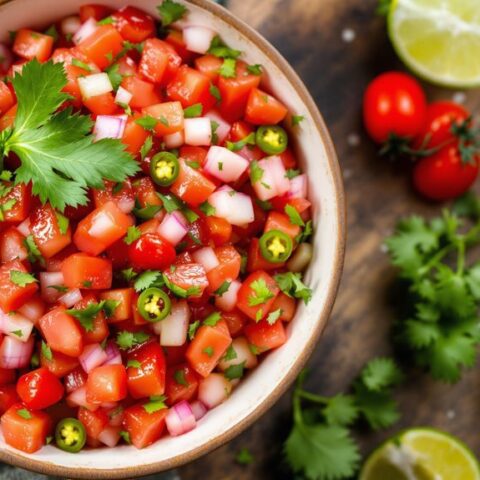
The caloric intake on a keto diet varies based on individual factors such as age, gender, weight, height, and activity level. Typically, women require 1,500-1,800 calories per day, while men need 1,800-2,200 calories. A well-balanced ketogenic diet consists of 70-80% fats, 10-20% proteins, and 5-10% carbohydrates. This macronutrient distribution supports ketosis and efficient fat burning. It's crucial to monitor both caloric and carbohydrate intake to prevent overeating and guarantee dietary success. Adjustments may be required depending on activity levels and weight loss progress, guiding long-term adherence and ideal results. For deeper insights, continue exploring the detailed guidelines.
Key Takeaways
- Daily Caloric Needs: Women generally need 1,500-1,800 calories, and men need 1,800-2,200 calories on a keto diet.
- Caloric Deficit: A 500 calorie/day deficit can lead to about 1 pound of weight loss per week.
- Macronutrient Ratio: Distribute calories to 70-80% fats, 10-20% proteins, and 5-10% carbohydrates.
- Carbohydrate Limit: Keep daily carb intake between 20-50 grams to maintain ketosis.
- Activity Level: Adjust calorie intake based on whether you are sedentary or active.
Keto Diet Basics
The ketogenic diet, often referred to as the keto diet, is centered around a specific macronutrient distribution: approximately 70-80% of total caloric intake from fats, 10-20% from proteins, and a minimal 5-10% from carbohydrates. The primary objective of these keto diet principles is to induce a metabolic state known as nutritional ketosis. In this state, the body shifts from using glucose as its primary energy source to utilizing ketones, which are derived from the breakdown of fats.
To adhere to the ketogenic diet, specific ketogenic food choices are emphasized. High-fat foods such as avocados, nuts, seeds, and oils are staples, along with moderate protein sources like eggs, meat, and poultry. Carbohydrate intake is strictly limited, generally to 20-50 grams of net carbs per day, encouraging the consumption of high-fiber vegetables that help maintain overall health and manage hunger.
This dietary approach is known to improve metabolic health by shifting the body's fuel source from glucose to fat, which can lead to better blood sugar control and lower insulin levels.
Tracking carbohydrate intake is more critical than counting calories in this diet, as maintaining ketosis is essential for achieving the intended weight loss and health benefits. These guidelines provide a clear framework for those looking to implement the keto diet effectively.
Caloric Needs Explained
Understanding daily caloric requirements is essential for effective weight management on a ketogenic diet.
Factors such as age, gender, weight, height, and activity level determine individual caloric needs, with moderately active men typically requiring 2,200-2,800 calories per day and women 1,800-2,200 calories.
Implementing a calorie deficit of approximately 500 calories per day can facilitate sustainable weight loss of about 1 pound per week, aligning with ketogenic dietary goals.
It's also important to monitor ketone levels to guarantee the body remains in ketosis for peak fat burning and health benefits.
Daily Caloric Requirements
Daily caloric requirements are essential in tailoring a ketogenic diet to individual needs, as they vary considerably based on factors such as age, weight, height, gender, and activity level. Understanding these requirements guarantees an ideal caloric balance, which is essential for effective energy expenditure and overall health.
Moderately active men typically require between 2,200 to 2,800 calories per day, while women need approximately 1,800 to 2,200 calories. Sedentary individuals should consume fewer calories due to lower energy expenditure, whereas those engaging in regular physical activity may need to increase their caloric intake to support their higher energy demands.
On a ketogenic diet, while there are no rigid calorie rules, suggested ranges are 1,500 to 1,800 calories for women and 1,800 to 2,200 for men. Monitoring caloric intake is vital, as high-calorie foods in the ketogenic diet can lead to unintentional overeating, even with low carbohydrate consumption.
Accurate assessment of daily caloric needs, combined with mindful eating practices, can help individuals maintain or achieve their desired weight while adhering to the principles of the ketogenic diet. This balanced approach supports sustainable health outcomes by aligning energy intake with expenditure.
Calorie Deficit Strategy**
Creating a calorie deficit is a fundamental strategy for weight loss on a ketogenic diet, necessitating a careful balance between caloric intake and expenditure. To achieve this, individuals must consume fewer calories than they burn, typically aiming for a 500-calorie deficit per day to lose approximately 1 pound per week.
Daily caloric needs vary based on factors such as age, gender, weight, height, and activity level. For moderately active men, the range is approximately 2,200-2,800 calories per day, while for women, it is about 1,800-2,200 calories.
Although the ketogenic diet does not mandate strict calorie counting, it suggests a general caloric intake of 1,500-1,800 calories for women and 1,800-2,200 calories for men, depending on individual needs.
Implementing effective calorie tracking becomes essential, particularly when consuming calorie-dense foods like nuts and cheese, to prevent overeating.
Establishing a sustainable intake within these parameters is vital for weight management and long-term success. By focusing on a balanced approach that incorporates macro balance, individuals can maintain a calorie deficit while ensuring nutritional needs are met.
This method supports not only weight loss goals but also overall health and well-being.
Keto and Weight Loss
Although the ketogenic diet is renowned for its emphasis on high-fat and low-carb foods, its effectiveness in weight loss often hinges on maintaining an appropriate caloric intake.
Despite common keto myths suggesting that calories do not matter as long as carb intake is low, evidence underscores the necessity of a caloric deficit for weight loss. Adhering to sustainable practices, women typically require 1,500-1,800 calories per day, while men need 1,800-2,200 calories, according to Atkins 20 Diet guidelines.
The initial phase may cause keto flu with symptoms like fatigue and nausea, which can affect energy levels and appetite.
A daily caloric deficit of approximately 500 calories is recommended to achieve sustainable weight loss, equating to roughly one pound per week. Overeating calorie-dense items such as cheese and nuts can impede progress; hence, monitoring intake remains vital.
Research suggests ketogenic diets may enhance calorie burning by about 250 calories per day, though individual variations exist.
Effective weight loss on a ketogenic diet often occurs naturally due to food choices that promote satiety, but tracking calorie consumption becomes essential if weight loss stalls.
Daily Caloric Intake
For individuals following a ketogenic diet, understanding daily caloric intake is crucial for achieving weight loss goals. On a keto diet, daily caloric intake for women is generally recommended to be between 1,500 to 1,800 calories, while men are advised to consume around 1,800 to 2,200 calories. This caloric range is designed to maintain a caloric balance conducive to weight loss without compromising nutritional needs.
The high-fat, moderate protein, and very low carbohydrate structure of the ketogenic diet necessitates specific dietary adjustments. Despite the satiating nature of high-fat foods, which can naturally curb overeating, individuals must be mindful of their intake. Overeating calorie-dense foods can hinder weight loss efforts, necessitating careful monitoring.
A sustainable calorie deficit of about 500 calories per day is often suggested to facilitate a weight loss of approximately 1 pound per week. This approach helps guarantee that the caloric balance is maintained while promoting gradual, healthy weight loss.
| Gender | Recommended Daily Calories |
|---|---|
| Women | 1,500 – 1,800 |
| Men | 1,800 – 2,200 |
| Deficit | ~500 calories/day |
| Net Carbs | 20-50 grams/day |
Monitoring daily intake is crucial if weight loss stalls, requiring further dietary adjustments as needed.
Macronutrient Ratios

Achieving the right macronutrient ratios is a cornerstone of the ketogenic diet, guaranteeing the body enters and maintains a state of ketosis. The macronutrient balance of the ketogenic diet typically involves consuming approximately 70-80% of calories from fat, 5-10% from carbohydrates, and 10-20% from protein.
For a standard 2,000-calorie diet, this translates to around 167-178 grams of fat, 25-50 grams of carbohydrates, and 50-100 grams of protein daily. Emphasizing nutrient quality, it is essential to focus on healthy fat sources such as avocados, nuts, and olive oil. Carb limits must be rigorously maintained at less than 50 grams per day to effectively induce and sustain ketosis.
Additionally, regular reassessment of macro needs is important due to changes in activity levels or goals. Protein types should be moderate to preserve muscle mass without kicking the body out of ketosis.
Dietary adjustments may be necessary based on individual goals, activity levels, and metabolic responses. Personalized ratios guarantee the diet can be tailored for long-term sustainability.
While the core principle of low carbohydrate intake remains, these adjustments help maintain the delicate macronutrient balance required for effective and sustainable weight management.
High-Calorie Keto Foods
High-calorie keto foods play an essential role in ensuring that individuals following a ketogenic diet can meet their energy needs while maintaining ketosis. Nuts and seeds are prime examples, offering around 600-800 calories per 100 grams, making them nutrient-dense and versatile for meal planning and snack options.
Avocados, with approximately 160 calories and 15 grams of healthy fats per medium-sized fruit, provide a nutrient-rich addition to various recipes. Additionally, fatty fish like salmon not only deliver high calories but also provide around 20g of protein per 3-ounce serving, supporting overall health.
Cheese, such as cheddar, contains about 400 calories per 100 grams, adding both flavor and essential fats to keto meals, while oils like olive oil and coconut oil, contributing about 120 calories per tablespoon, are excellent for cooking and salad dressings.
Fatty fish, particularly salmon, delivers around 206 calories and 13 grams of beneficial fats per 100 grams, ensuring sufficient energy and essential omega-3 fatty acids.
Incorporating these high-calorie foods into meal planning requires mindful portion control and food variety to maintain a balanced ketogenic diet. Recipe ideas could include using ingredient substitutions to enhance nutrient density.
Effective food pairing, such as combining avocados with salmon or cheese, can optimize both flavor and nutritional benefits, supporting sustained energy and health on a ketogenic diet.
Metabolism on Keto

The ketogenic diet may lead to an increased caloric burn of approximately 250 calories per day, although the scientific community lacks consensus on this effect.
By shifting from glucose to ketones as the primary energy source, the diet can influence metabolic rate, potentially resulting in a modest increase compared to higher-carb diets.
Ketosis enhances fat oxidation and mobilization, leading to increased fat burning and reduced hunger.
However, it is essential to maintain a balanced calorie intake for effective weight management, as relying solely on metabolic changes is not advisable.
Increased Caloric Burn
Often, individuals on a ketogenic diet may experience an increase in caloric burn, primarily driven by enhanced fat oxidation and improved metabolic efficiency. This change occurs as the body adapts to using ketones as a primary energy source instead of glucose, resulting in different energy expenditure dynamics.
Studies suggest that this adaptation may lead to an increase in calorie burning by approximately 250 calories per day. However, it is essential to recognize that this increase can vary among individuals based on factors such as body composition, activity level, and individual metabolic responses to the high-fat diet.
To provide a clearer understanding, consider these key points:
- Enhanced Fat Oxidation: On a ketogenic diet, the body becomes more efficient at burning fat, which can boost overall energy expenditure.
- Metabolic Adaptation: The shift to ketosis alters metabolic processes, potentially increasing caloric burn compared to carbohydrate-based diets.
- Individual Variability: Personal characteristics such as body composition and activity levels notably influence the degree of increased caloric burn experienced.
While the ketogenic diet may lead to a temporary boost in energy expenditure, relying solely on this effect for weight management is not advisable. Maintaining a balanced caloric intake remains vital for long-term success.
Impact on Metabolic Rate
Building on the increased caloric burn observed with ketogenic diets, it's important to examine their impact on metabolic rate. Research indicates that ketogenic diets may boost energy expenditure by approximately 250 calories per day, primarily due to metabolic adaptations such as increased fat oxidation and the thermic effect of processing high-fat foods.
These adaptations can contribute to an enhanced metabolic rate, though individual outcomes can vary based on body composition, activity levels, and strict adherence to macronutrient ratios.
However, it is essential to note that there is no scientific consensus that ketogenic diets boost metabolism more effectively than other dietary approaches in the long term. While the initial increase in metabolic rate may be beneficial, relying solely on this mechanism for weight management is not advisable.
Sustainable weight loss should integrate proper caloric intake and a balanced approach to macronutrient consumption. Adhering to a normal, healthy calorie range is recommended for those on a ketogenic diet to achieve lasting weight loss outcomes.
This strategy guarantees that the metabolic benefits of the diet are maximized without compromising nutritional health or overestimating the influence of energy expenditure on overall weight management.
Ketosis and Energy Utilization
In the context of a ketogenic diet, the body's energy utilization undergoes a significant transformation, primarily characterized by a shift from glucose to ketones as the primary fuel source. This metabolic shift is initiated when carbohydrate intake is reduced to less than 50 grams per day, prompting the body to enter ketosis. Ketone bodies, such as acetoacetate, beta-hydroxybutyrate, and acetone, become the dominant energy substrates, offering several ketosis benefits including increased energy efficiency and metabolic flexibility.
Key Aspects of Energy Utilization on Keto:
- Fat Adaptation: The process of ketone production from fatty acids is stimulated by low insulin levels and increased glucagon. This encourages the body to utilize fat stores for energy, enhancing fat adaptation.
- Enhanced Calorie Burning: Research indicates that ketogenic diets may increase daily calorie burning by approximately 250 calories due to enhanced fat oxidation and metabolic adaptations. This contributes to overall energy efficiency.
- Brain Fuel: Ketones serve as a more efficient brain fuel compared to glucose, particularly during periods of low carbohydrate availability. This underscores the importance of nutrient timing and maintaining high fat intake (70-80% of total calories) for peak ketone production and sustained energy levels.
Tracking Carbs Vs Calories
The ketogenic diet's fundamental principle revolves around the meticulous tracking of carbohydrate intake rather than focusing primarily on calories. A typical keto regimen limits carbohydrate consumption to 20-50 grams of net carbs per day, which comprises about 5-10% of total daily calories. This carb awareness is vital for achieving and maintaining ketosis, the metabolic state where the body burns fat for fuel instead of carbohydrates.
To streamline your grocery shopping, focus on perimeter aisles for fresh produce and meats, which are typically Keto-friendly staples.
While calorie balance is not the central focus of the keto diet, it remains an important consideration. High-calorie foods such as nuts and cheese can inadvertently contribute to excessive calorie intake if not properly portioned. Consequently, while traditional calorie counting is less emphasized, maintaining a balance is still essential to prevent weight gain or plateauing.
Regular tracking of carbohydrate intake helps individuals stay within their keto limits and promotes overall dietary awareness. Utilizing apps or food journals to monitor both carbohydrates and calories can provide valuable insights, especially when weight loss stalls despite adherence to keto guidelines.
Through diligent carb awareness and mindful calorie consumption, individuals can better navigate their dietary choices to optimize their keto journey.
Monitoring Intake
Monitoring daily calorie intake is essential on a ketogenic diet, particularly when weight loss plateaus, as consuming calorie-dense foods like cheese can impede progress.
Although high-fat foods naturally promote satiety, tracking overall calorie consumption remains important to avoid overeating.
Utilizing apps or food diaries to monitor both macronutrient ratios and caloric intake can help maintain ketosis and support weight management goals effectively.
Regular tracking of carbohydrate intake is also vital for success; understanding net carbs helps prevent unintended excessive carbohydrate consumption.
Tracking Daily Calories
When starting on a ketogenic diet, keeping a close eye on daily calorie consumption can be vital, particularly if weight loss progress begins to plateau.
While the ketogenic diet emphasizes macronutrient ratios over strict calorie counting, maintaining awareness of caloric intake remains essential. Calorie tracking guarantees that individuals stay within recommended ranges—1,500-1,800 calories for women and 1,800-2,200 calories for men—thereby supporting weight loss and overall health goals.
To effectively monitor daily intake, consider the following steps:
- Utilize Tracking Apps: Digital tools like MyFitnessPal can simplify the process of calorie tracking and help maintain macronutrient balance.
- Practice Portion Control: Be mindful of serving sizes, especially with calorie-dense foods like nuts and cheese, to prevent unintentional overeating.
- Set Realistic Goals: Align daily calorie limits with personal energy needs and weight loss targets, adjusting as necessary based on progress.
Managing Calorie-Dense Foods
Effectively managing the intake of calorie-dense foods is essential for success on a ketogenic diet. While high-fat foods such as nuts, cheese, and oils are staples of the keto diet, their high caloric content necessitates careful monitoring to avoid exceeding daily caloric needs, which can hinder weight loss.
For instance, one ounce of macadamia nuts contains approximately 200 calories. Consequently, implementing nut portion control is critical to prevent unintentional caloric overconsumption.
Mindful eating practices are important for maintaining an appropriate caloric intake. This involves being aware of portion sizes and recognizing the satiating properties of high-fat foods without overindulging. Tracking daily calorie consumption can reveal patterns of overeating calorie-dense foods, which is particularly useful if weight loss plateaus.
Consuming just 100 calories more than needed daily can lead to gradual weight gain, highlighting the importance of vigilance.
Ultimately, the ketogenic diet's allowance for higher fat intake is not a license for unrestricted consumption of low-carb foods. Awareness of calorie content is fundamental for effective weight management and achieving weight loss goals.
Avoid Overeating Pitfalls
Building upon the importance of managing calorie-dense foods, it becomes equally important to address the common pitfalls associated with overeating on a ketogenic diet. High-calorie foods such as cheese and nuts, while low in carbs, can lead to inadvertent overeating if not consumed mindfully.
Monitoring intake and exercising portion control are vital for sustaining weight loss and avoiding unnecessary calorie surplus.
To successfully navigate these pitfalls, consider implementing the following strategies:
- Track Your Intake: Utilize apps or food journals to log daily caloric consumption. This helps identify if calorie-dense foods are contributing to stalls in weight loss, ensuring you remain within your targeted calorie range.
- Practice Mindful Eating: Pay attention to hunger and satiety cues. Eating slowly and savoring each bite can prevent overeating, allowing you to enjoy your meals without exceeding your caloric needs.
- Portion Control: Pre-portion snacks like nuts and cheese to avoid mindless munching. Using smaller plates can also help manage portions and reduce the likelihood of overconsumption.
Common Pitfalls
One of the most common pitfalls for individuals on the keto diet is the overconsumption of calorie-dense foods, such as cheese and nuts. This often stems from keto misconceptions that allow dieters to believe they can eat unlimited amounts of low-carb foods without regard for caloric intake. Such misunderstandings can lead to significant weight loss stalls.
It is essential to understand that while the keto diet emphasizes low carbohydrate consumption, food portioning remains important to manage caloric intake effectively. Furthermore, staying hydrated to alleviate discomfort and ensuring electrolyte balance are critical to avoid common symptoms like headaches and fatigue.
Tracking daily calorie consumption becomes particularly important if individuals experience a weight loss plateau. The absence of strict calorie counting in the keto regimen can create a false sense of security, making it easy to exceed caloric needs inadvertently. This can be especially challenging for those new to keto, as the diet's restrictive nature can trigger cravings and subsequent bingeing on allowed foods.
Dieters should employ mindful eating practices and be vigilant in monitoring portions to avoid these pitfalls. By acknowledging and addressing these common issues, individuals can enhance their adherence to the keto diet, thereby supporting their overall weight loss and health goals more effectively.
Physical Activity's Role

Addressing common pitfalls in caloric management is not the only factor influencing the success of a ketogenic diet. An equally important component is engaging in regular physical activity, which provides numerous exercise benefits that enhance the keto lifestyle.
Incorporating various activity types, such as strength training and cardio, markedly boosts metabolic rate and promotes muscle preservation. This balanced approach not only aids fat loss but also enhances overall caloric burn. Additionally, the adaptation phase of the diet can impact initial performance, making consistent exercise even more essential to maintain stamina and mitigate fatigue.
To maximize the effectiveness of a ketogenic diet, consider the following exercise guidelines:
- Workout Frequency: Aim for three to four exercise sessions per week to optimize weight loss results and maintain adherence to the diet.
- Activity Types: Integrate a mix of strength training and cardio benefits to guarantee a thorough workout that stimulates metabolic boost and muscle retention.
- Energy Levels and Mood Enhancement: Regular physical activity can counteract potential keto side effects like fatigue and irritability, thus improving energy levels and mood.
Studies have shown that combining a ketogenic diet with consistent exercise can lead to more considerable reductions in body fat compared to diet alone.
Consequently, a well-rounded routine incorporating varied physical activities not only supports fat loss but also contributes to overall well-being.
Psychological Considerations
Although the ketogenic diet is widely recognized for its effectiveness in weight loss and metabolic health, its psychological impact must not be overlooked. The restrictive nature of the diet can foster a transactional relationship with food, emphasizing macronutrient content over enjoyment and social eating. This shift may exacerbate emotional eating and complicate food relationships, particularly for those with a history of disordered eating.
Adherence challenges often arise due to cravings management and the dissatisfaction of eliminating entire food groups. Establishing psychological support, such as professional guidance or a support system, is vital for maintaining compliance. The initial phase, often marked by "keto flu," can induce symptoms like irritability and fatigue, further impacting motivation and adherence.
Implementing mindful eating and stress management techniques can greatly enhance psychological well-being. Practices such as dietary mindfulness and coping strategies help mitigate emotional eating and improve food relationships.
Additionally, stress reduction techniques can alleviate adherence challenges, making the diet more sustainable.
Setting Realistic Goals

Understanding the psychological dynamics of dieting underscores the importance of setting realistic goals when starting on a ketogenic diet. Effective goal setting is essential for achieving weight loss and maintaining long-term success. Typically, a gradual weight loss of 1-3 pounds per week is recommended, as it is both sustainable and healthy. This involves creating a daily calorie deficit of about 500 calories, which aligns with general weight management guidelines.
To tailor your goals effectively, consider your unique caloric needs based on individual factors such as age, sex, weight, height, and activity level. Utilizing SMART goals—specific, measurable, achievable, relevant, and time-bound—can greatly enhance your commitment to the ketogenic diet.
Tracking progress through various methods, rather than solely relying on the scale, helps adjust goals and maintain motivation.
Here are three steps to set realistic goals for weight loss on a ketogenic diet:
- Determine Caloric Needs: Calculate your daily caloric requirements considering personal factors and aim for a 500-calorie deficit.
- Set SMART Goals: Establish specific, measurable, achievable, relevant, and time-bound goals to guide your weight loss journey.
- Track Progress: Use regular measurements and other indicators beyond weight to monitor progress and adjust goals as needed.
Frequently Asked Questions
How Many Calories Can I Eat on Keto and Still Lose Weight?
To facilitate weight loss on a ketogenic diet, keto meal planning should target 1,500-1,800 calories for women and 1,800-2,200 calories for men, while focusing on appropriate macronutrient ratios to guarantee nutritional adequacy and satiety.
Do You Count Calories on a Keto Diet?
While the ketogenic diet primarily focuses on limiting carbohydrates, calorie tracking remains important to avoid common keto myths and guarantee effective weight management. Monitoring caloric intake helps prevent overeating high-calorie foods and supports sustained weight loss.
How Many Calories Is Keto Friendly?
On a ketogenic diet, the recommended caloric intake varies by gender: women typically consume 1,500-1,800 calories, while men consume 1,800-2,200 calories. Focus on keto-friendly foods and manage calorie sources for ideal weight loss.
Can I Lose Weight Eating 2000 Calories on Keto?
Weight loss while consuming 2000 calories on a ketogenic diet is possible with proper keto meal planning and diligent calorie tracking. Individual factors such as metabolism and activity level play an essential role in determining weight loss outcomes.
Conclusion
In summary, the keto diet necessitates careful consideration of caloric intake, macronutrient ratios, and individual energy requirements. Adhering to a high-fat, low-carbohydrate regimen can facilitate weight loss, provided that caloric consumption aligns with metabolic needs. Awareness of common pitfalls and the integration of physical activity are essential for sustained success. Psychological factors and realistic goal-setting further enhance the likelihood of achieving desired outcomes on a ketogenic diet. Thorough planning and adherence to guidelines guarantee peak results.










No Comments